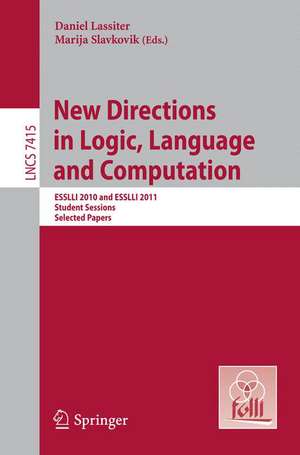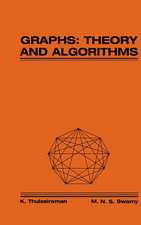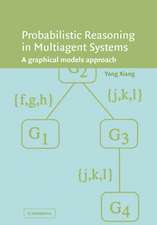New Directions in Logic, Language, and Computation: ESSLLI 2010 and ESSLLI 2011 Student Sessions, Selected Papers: Lecture Notes in Computer Science, cartea 7415
Editat de Daniel Lassiter, Marija Slavkoviken Limba Engleză Paperback – 26 iul 2012
Din seria Lecture Notes in Computer Science
- 20%
 Preț: 1061.55 lei
Preț: 1061.55 lei - 20%
 Preț: 307.71 lei
Preț: 307.71 lei - 20%
 Preț: 438.69 lei
Preț: 438.69 lei - 20%
 Preț: 579.30 lei
Preț: 579.30 lei -
 Preț: 410.88 lei
Preț: 410.88 lei - 17%
 Preț: 427.22 lei
Preț: 427.22 lei - 20%
 Preț: 596.46 lei
Preț: 596.46 lei - 15%
 Preț: 448.04 lei
Preț: 448.04 lei - 20%
 Preț: 353.50 lei
Preț: 353.50 lei -
 Preț: 389.49 lei
Preț: 389.49 lei - 20%
 Preț: 309.90 lei
Preț: 309.90 lei - 20%
 Preț: 645.28 lei
Preț: 645.28 lei - 20%
 Preț: 763.23 lei
Preț: 763.23 lei - 15%
 Preț: 580.46 lei
Preț: 580.46 lei - 20%
 Preț: 310.28 lei
Preț: 310.28 lei - 20%
 Preț: 655.02 lei
Preț: 655.02 lei - 20%
 Preț: 1183.14 lei
Preț: 1183.14 lei - 20%
 Preț: 340.32 lei
Preț: 340.32 lei -
 Preț: 449.57 lei
Preț: 449.57 lei - 20%
 Preț: 591.51 lei
Preț: 591.51 lei - 18%
 Preț: 938.83 lei
Preț: 938.83 lei - 20%
 Preț: 337.00 lei
Preț: 337.00 lei - 20%
 Preț: 649.50 lei
Preț: 649.50 lei - 20%
 Preț: 607.40 lei
Preț: 607.40 lei - 20%
 Preț: 1414.79 lei
Preț: 1414.79 lei - 20%
 Preț: 1024.44 lei
Preț: 1024.44 lei - 20%
 Preț: 583.40 lei
Preț: 583.40 lei - 20%
 Preț: 453.32 lei
Preț: 453.32 lei - 20%
 Preț: 575.49 lei
Preț: 575.49 lei - 20%
 Preț: 1075.26 lei
Preț: 1075.26 lei - 20%
 Preț: 585.88 lei
Preț: 585.88 lei - 20%
 Preț: 825.93 lei
Preț: 825.93 lei - 17%
 Preț: 360.20 lei
Preț: 360.20 lei - 20%
 Preț: 763.23 lei
Preț: 763.23 lei - 20%
 Preț: 340.32 lei
Preț: 340.32 lei - 20%
 Preț: 504.58 lei
Preț: 504.58 lei - 20%
 Preț: 369.13 lei
Preț: 369.13 lei - 20%
 Preț: 580.93 lei
Preț: 580.93 lei - 20%
 Preț: 343.62 lei
Preț: 343.62 lei - 20%
 Preț: 350.21 lei
Preț: 350.21 lei - 20%
 Preț: 583.40 lei
Preț: 583.40 lei - 20%
 Preț: 583.40 lei
Preț: 583.40 lei - 15%
 Preț: 438.59 lei
Preț: 438.59 lei - 20%
 Preț: 341.95 lei
Preț: 341.95 lei - 20%
 Preț: 238.01 lei
Preț: 238.01 lei - 20%
 Preț: 538.30 lei
Preț: 538.30 lei
Preț: 301.31 lei
Preț vechi: 376.64 lei
-20% Nou
Puncte Express: 452
Preț estimativ în valută:
57.66€ • 62.61$ • 48.44£
57.66€ • 62.61$ • 48.44£
Carte tipărită la comandă
Livrare economică 22 aprilie-06 mai
Preluare comenzi: 021 569.72.76
Specificații
ISBN-13: 9783642314667
ISBN-10: 364231466X
Pagini: 260
Ilustrații: X, 250 p. 38 illus.
Dimensiuni: 155 x 235 x 15 mm
Greutate: 0.35 kg
Ediția:2012
Editura: Springer Berlin, Heidelberg
Colecția Springer
Seriile Lecture Notes in Computer Science, Theoretical Computer Science and General Issues
Locul publicării:Berlin, Heidelberg, Germany
ISBN-10: 364231466X
Pagini: 260
Ilustrații: X, 250 p. 38 illus.
Dimensiuni: 155 x 235 x 15 mm
Greutate: 0.35 kg
Ediția:2012
Editura: Springer Berlin, Heidelberg
Colecția Springer
Seriile Lecture Notes in Computer Science, Theoretical Computer Science and General Issues
Locul publicării:Berlin, Heidelberg, Germany
Public țintă
ResearchCuprins
Language and Computation.- Predicting the Position of Attributive Adjectives in the French NP.-Abductive Reasoning for Continual Dialogue Understanding.-SCA: Phonetic Alignment Based on Sound Classes.-Embodied Quantifiers.-Ranked Multidimensional Dialogue Act Annotation.-Logic and Computation.-The Good, the Bad, and the Odd: Cycles in Answer-Set Programs.-Distributed Knowledge with Justifications.-Epistemic Logic, Relevant Alternatives, and the Dynamics of Context.Towards a Generalization of Modal Definability.-Modeling Semantic Competence: A Critical Review of Frege’s Puzzle about Identity.-Comparing Inconsistency Resolutions in Multi-Context Systems.-Logic and Language Vague Determiner Phrases and Distributive Predication.-The Syntax and Semantics of Evaluative Degree Modification.-A Kripkean Solution to Paradoxes of Denotation.-Trust Games as a Model for Requests.-
Textul de pe ultima copertă
The European Summer School in Logic, Language and Information (ESSLLI) is organized every year by the Association for Logic, Language and Information (FoLLI) in different sites around Europe. The main focus of ESSLLI is on the interface between linguistics, logic and computation. ESSLLI offers foundational, introductory and advanced courses, as well as workshops, covering a wide variety of topics within the three areas of interest: Language and Computation, Language and Logic, and Logic and Computation.
During two weeks, around 50 courses and 10 workshops are offered to the attendants, each of 1.5 hours per day during a five days week, with up to seven parallel sessions. ESSLLI also includes a student session (papers and posters by students only, 1.5 hour per day during the two weeks) and four evening lectures by senior scientists in the covered areas.
The 15 revised full papers presented were carefully reviewed and selected. The papers are organized in topical sections on The papers are organized in topical sections on language and computation; logic and computation; and logic and language.
During two weeks, around 50 courses and 10 workshops are offered to the attendants, each of 1.5 hours per day during a five days week, with up to seven parallel sessions. ESSLLI also includes a student session (papers and posters by students only, 1.5 hour per day during the two weeks) and four evening lectures by senior scientists in the covered areas.
The 15 revised full papers presented were carefully reviewed and selected. The papers are organized in topical sections on The papers are organized in topical sections on language and computation; logic and computation; and logic and language.
Caracteristici
Summer school proceedings State-of-the-art research in logics Up-to-date results













